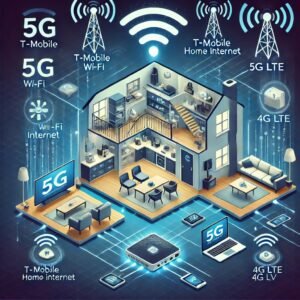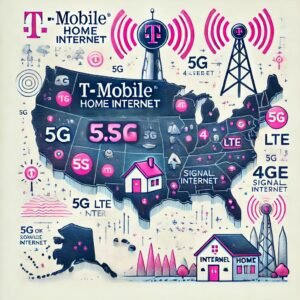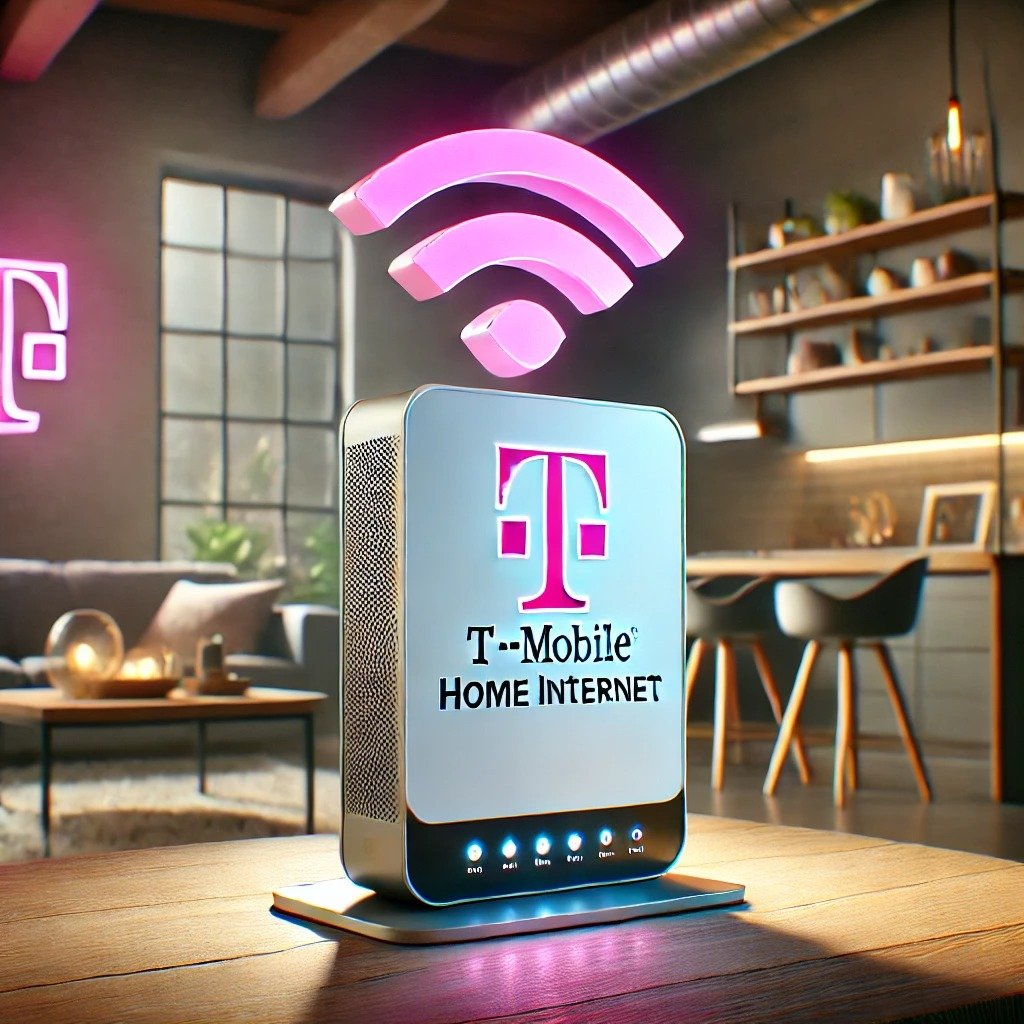TMobile Home Internet has emerged as a significant player in the broadband market, offering a unique blend of affordability, convenience, and speed. As more households across the United States search for reliable and cost-effective internet solutions, TMobile’s Home Internet service has gained attention for its promising features and broad coverage. This article delves into the details of TMobile Home Internet, exploring its features, benefits, limitations, and how it compares to other internet service providers (ISPs).
What is TMobile Home Internet?
TMobile Home Internet is a wireless internet service that uses the company’s 4G LTE and 5G networks to deliver broadband access to homes. Unlike traditional wired internet services, which rely on physical connections like fiber or cable, TMobile’s service leverages its extensive mobile network infrastructure. This approach allows for a more flexible and potentially more accessible service, especially in areas where wired broadband is limited or unavailable.
How TMobile Home Internet Works
The service is designed to be as simple and user-friendly as possible. Upon signing up, users receive a TMobile gateway device, which is a combination of a modem and a router. This device connects to TMobile’s mobile network, converting the signal into a Wi-Fi connection that can be used by multiple devices in the home.
One of the key advantages of this setup is its ease of installation. Unlike traditional ISPs that often require professional installation, T-Mobile Home Internet can be set up by the user within minutes. The gateway device is plug-and-play, meaning users only need to power it on, follow a few on-screen instructions, and they’re ready to go.
Coverage and Availability
TMobile’s Home Internet service is available in many parts of the United States, but its coverage is not as widespread as some traditional ISPs. The service is primarily targeted at suburban and rural areas, where traditional broadband options may be limited. However, the availability of the service depends largely on TMobile’s network infrastructure in a given area.
The company has been rapidly expanding its 5G network, which is critical to the performance and reach of its Home Internet service. In areas where TMobile has a strong 5G presence, customers can expect faster speeds and more reliable service. However, in areas where only 4G LTE is available, speeds may be lower.
Internet Speeds and Performance
TMobile Home Internet offers varying speeds depending on the network infrastructure in the area. In areas with robust 5G coverage, users can experience download speeds ranging from 100 to 300 Mbps, with some areas even reaching up to 500 Mbps. However, in areas relying on 4G LTE, speeds may be closer to 25 to 50 Mbps.
While these speeds are sufficient for most households, particularly those involved in general browsing, streaming, and video conferencing, they may not be suitable for heavy data usage like 4K streaming on multiple devices or online gaming with low latency requirements.
It’s important to note that because TMobile Home Internet relies on a wireless network, speeds can vary depending on several factors, including network congestion, the distance of the user’s home from the nearest cell tower, and even weather conditions.
Pricing and Plans
One of the major selling points of TMobile Home Internet is its straightforward pricing. As of now, the service is offered at a flat rate, typically around $50 per month with no annual contracts, data caps, or hidden fees. This simplicity is a breath of fresh air in an industry often criticized for complex pricing structures and unexpected charges.
Additionally, TMobile often includes the cost of the gateway device in the monthly fee, meaning there are no additional charges for equipment rental. This is in contrast to many traditional ISPs, which often charge extra for modem and router rentals.
Comparison with Traditional ISPs
When comparing TMobile Home Internet with traditional ISPs, several factors come into play. The most significant differences lie in the type of connection, coverage, and pricing.
Connection Type: Traditional ISPs typically use wired connections such as cable, DSL, or fiber, which can offer higher and more consistent speeds compared to TMobile’s wireless service. However, these wired connections can be more expensive to install, particularly in rural or less densely populated areas. TMobile’s wireless service, on the other hand, can be set up almost anywhere within the coverage area without the need for physical infrastructure.
Coverage: Traditional ISPs often have limited coverage in rural areas, leaving many customers with few, if any, broadband options. Unlike traditional ISPs, T-Mobile Home Internet provides a flat-rate pricing model with no hidden fees, making it an affordable option for many households. TMobile’s Home Internet aims to fill this gap by providing wireless broadband to underserved areas. However, the service is still dependent on the presence of TMobile’s mobile network, so it may not be available everywhere.
Pricing: TMobile’s flat-rate pricing is a major advantage over traditional ISPs, which often have complicated pricing tiers based on speed, data usage, and contract length. TMobile’s simple pricing model, without data caps or overage fees, is particularly appealing to customers tired of the unpredictable costs associated with traditional broadband services.
Benefits of TMobile Home Internet
TMobile Home Internet offers several benefits that make it an attractive option for many households.
Ease of Use: The plug-and-play nature of the service makes it accessible even to those who are not tech-savvy. There’s no need to schedule an installation or deal with complicated wiring—just set up the gateway device, and you’re ready to go.
Affordability: With a flat-rate pricing model and no hidden fees, TMobile Home Internet is a cost-effective option for many households, especially those looking to cut the cord from traditional ISPs.
Flexibility: Since the service is wireless, it’s inherently more flexible than wired options. Users can take the gateway device with them if they move, as long as they’re still within T-Mobile’s coverage area. This portability is particularly useful for renters or those who move frequently.
No Contracts: Unlike many traditional ISPs that require long-term contracts with hefty early termination fees, TMobile Home Internet offers a month-to-month plan, giving users the freedom to cancel at any time without penalty.
Limitations of TMobile Home Internet
While TMobile Home Internet offers many advantages, it also has some limitations that potential users should be aware of.
Speed Variability: Because the service relies on a wireless network, speeds can be inconsistent, especially in areas with weaker coverage or higher network congestion. This can be a drawback for households that require consistently high-speed internet for activities like online gaming or streaming in 4K.
Limited Availability: Despite TMobile’s extensive network, the Home Internet service is not available everywhere. It is more prevalent in suburban and rural areas, but coverage can still be spotty in some regions. Before signing up, it’s important to check whether the service is available in your area.
Network Prioritization: TMobile Home Internet customers may experience reduced speeds during times of network congestion. This is because mobile customers on TMobile’s network are given priority over Home Internet users. This can result in slower speeds during peak usage times.
Data Throttling: Although TMobile does not impose data caps, heavy users may experience data throttling if they exceed a certain threshold of usage, particularly during congested periods. This is another factor that can impact the overall performance of the service.
Customer Experiences and Reviews
Customer experiences with TMobile Home Internet have been generally positive, particularly regarding the simplicity of setup and the clarity of pricing. Many users appreciate the absence of hidden fees and the convenience of not having to commit to a long-term contract.
However, some customers have reported issues with speed variability and network reliability, particularly in areas with less robust 5G coverage .T-Mobile’s Home Internet offers a simple, plug-and-play setup, allowing users to get online quickly without the need for professional installation. Others have noted that while the service is excellent for general use, it may not be sufficient for households with very high data demands.
Conclusion: Is TMobile Home Internet Right for You?
TMobile Home Internet presents a compelling option for those seeking an affordable, flexible, and easy-to-use broadband solution, particularly in areas where traditional ISPs fall short. With T-Mobile’s extensive 5G network, the Home Internet service delivers impressive speeds, making it a strong competitor in the broadband market. Its flat-rate pricing, lack of contracts, and user-friendly setup make it an attractive choice for many households.
However, potential users should weigh the pros and cons, particularly in terms of speed variability and coverage. If you live in an area with strong 5G coverage and have moderate internet usage needs, TMobile Home Internet could be an excellent fit. However, if you require consistently high speeds for activities like online gaming or 4K streaming, it may be worth exploring other options.
In conclusion, TMobile Home Internet is a viable alternative to traditional ISPs, offering a blend of convenience and value that is hard to beat in today’s broadband market. As T-Mobile continues to expand its network, the service is likely to become an even more attractive option for a growing number of households across the United States.
ALSO READ
